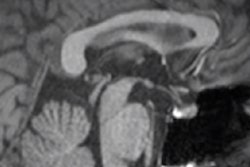Monday, November 27 | 11:50 a.m.-12:00 p.m. | RC215-17 | Arie Crown Theater
In this session, researchers will discuss how neural networks based on a breast MRI tumor dataset can help clinicians predict patient response to neoadjuvant chemotherapy.The study, led by Dr. Jenika Karcich of Columbia University, included 142 breast cancer patients who underwent breast MRI before neoadjuvant chemotherapy, successfully completed the treatment course, and then underwent surgical resection between January 2009 and June 2016.
The researchers classified the patients into three groups:
- Pathologic complete response (46 patients)
- Pathologic partial response (57 patients)
- No response (39 patients)
Of the 142 cases, 80% were randomized into a training set, and 20% were used to test the model.
The neural network had an overall accuracy of 86% in predicting treatment response across all three groups, Karcich and colleagues found.
"Deep learning through convolutional neural networks can provide early prediction of a patient's treatment response to conventional therapies, which can direct novel targeted cancer therapy in potential poor responders," the researchers concluded.





















